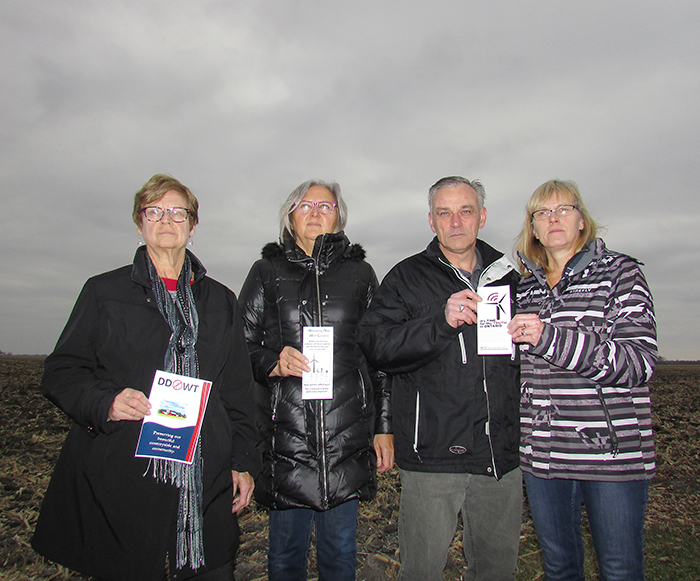
Four citizen action groups concerned with wind turbine projects in Ontario have banded together to file legal action against the Ontario government for not requiring the projects to adhere to new government regulations regarding noise levels.
At a press conference recently at the home of Dan and Diana Donkers on Langstaff Line near Wallaceburg, members of the four groups, including Wallaceburg Area Wind Concerns (WAWC), spoke about their concerns and frustrations with the lack of action by the Ontario government to protect the interests of residents in the project areas.
WAWC formed after the Otter Creek wind turbine project near Wallaceburg was proposed with 12 “super turbines” that will be twice the size of regular wind turbines, each at 680 feet in height.
Bonnie Rowe, spokesperson for the Dutton Dunwich Opponents of Wind Turbines (DDOWT), said the Ministry of the Environment and Climate Change “has admitted previous guidelines have resulted in underestimates of the noise at nearby homes, however, without any evidence that this was necessary, the MOECC has allowed companies promoting at least five large-scale wind projects to ignore new government guidelines.”
A Notice of Application for Judicial Review was filed by DDOWT in the Divisional Court in Toronto last Tuesday against the MOECC, Rowe said, alleging the ministry “erred in law” by failing to obtain any evidence that the wind companies were unable to comply with the new guidelines, and failed to meet the legitimate expectations of area residents that noise modelling guidelines as set by the MOECC would be followed, and negligently misrepresented their own noise regulations and the impact on the citizens “using old and inadequate guidelines.”
According to the notice, the proponents of all five of the IWT (industrial wind turbine) projects approved under the LRP 1 (large renewal project) program have opted to go ahead without correcting errors in the noise modelling under “transition provisions” and as a result, the majority of the proposed turbine sites may be out of compliance with the new regulation and its directives regarding noise levels and setbacks.
“The MOECC has allowed the wind companies to side step the new regulations, solely for the proponents’ convenience and expediency,” Rowe said at the press conference. “We estimate that up to three-quarters of the turbines that are proposed for these five projects would have to be relocated or removed.”
The group wants the courts to require the wind turbine companies to adhere to new regulations.
Violet Towell, representing WAWC at the press conference, said of the Otter Creek project that 11 of 12 turbines would be out of compliance according to the new noise regulation for homes closest to the turbines.
“The companies took advantage of this option and decided to deny the residents this additional protection even though they could have done so,” Towell said. “We brought these issues, among others, to the MOECC to no avail. We fully support this judicial review.”
In a letter sent to the ministry in October, WAWC asked for a second noise assessment to be completed and presented to the public, citing a lack of noise data from the company to make any predictions on noise levels. Towell said Boralex, the company behind the Otter Creek project, admitted to not having the noise output data required for the technical review of the project.
The Donkers, whose home is on Langstaff Line west of Wallaceburg, will have four turbines around their property if the project proceeds as outlined, with three of the four anticipated to be out of compliance with the new noise regulation.
The mayor of Dutton Dunwich, Cameron McWilliam, was also at the press conference to support DDOWT and the judicial review, and said the municipality is not a willing host to IWT projects.
“Our community held a vote and 84 per cent voted against hosting a wind project in Dutton Dunwich so through that process, we have been with ministry reps and the company to talk about issues that we have questions and no answers,” McWilliam said. “Unfortunately, the joint opposition groups of the five LRP 1 projects in Ontario have been forced to go to the judicial review to get answers to just one part of that project, in this case noise.”
He added that the community feels the project should be slowed down and halted until they are able to get more information and find out why the government is allowing the projects to go ahead when there are new guidelines.
“I think that the representation at the government level doesn’t include a lot of rural members and they have forgotten about the whole of Ontario. We don’t live in the province of Toronto; we live in the Province of Ontario and they have to recognize that,” McWilliam said.
Towell, when asked about the support being given to the citizens by McWilliams in contrast to Chatham-Kent Mayor Randy Hope, said Hope’s lack of support for residents “is very frustrating and has been all along.
“The fact that we are a welcoming community has allowed for this proliferation of wind turbines and it’s concerning. In hindsight, maybe they would say they shouldn’t have gone down this road, but they did and here we are. It is frustrating,” she noted. “It’s great to hear a mayor speak so supportively of a community because he is listening to them and listening to what their concerns are.”
The other groups involved in the judicial review include Concerned Citizens of North Stormont and Save the Nation in eastern Ontario. The fifth project not involved in the review is the Romney Wind Energy Centre.
Rowe said it’s time for the government to put people first.
“Think about the safety of the citizens of Ontario first, and the expediency of completing the requirements of your Green Energy Act second,” she said. “We feel like we are collateral damage in this whole Green Energy Act, to be perfectly honest, and that’s not right. There are too many people impacted by their decisions.”
The MOECC has not yet responded to the judicial review application.






